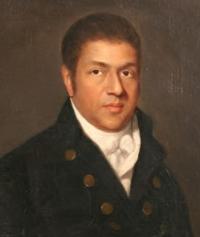 During Black History Month, it is worthwhile to remember early African-American shipmasters. Who was the first? That is hard to say. Paul Cuffee is a good candidate. An updated repost.
During Black History Month, it is worthwhile to remember early African-American shipmasters. Who was the first? That is hard to say. Paul Cuffee is a good candidate. An updated repost.
Paul Cuffee was born on Cuttyhunk Island, MA on January 17, 1759, the seventh of ten children of Kofi or Cuffee Slocum and Ruth Moses. His father, a freed black man, was a member of the Ashanti people of Ghana. His mother was a Native American of the Wampanoag Nation of Martha’s Vineyard. Cuffee Slocum was a skilled carpenter, farmer, and fisherman, who taught himself to read and write. In 1766, Cuffee Slocum was able to purchase a 116-acre farm in Westport, Massachusetts.
Paul Cuffee went to sea at 16 on whalers and merchant ships, where he learned navigation. During the American Revolution, his ship was captured by the British and Cuffee was imprisoned for three months in 1776 in New York. He returned home to Massachusetts and in 1779 built an open boat which he used to run the British blockade, bringing trade goods to Nantucket and ports on the Massachusetts coast.
He built up a small fleet of open boats and then moved on to schooners. His first seagoing vessel was the 15-ton Box Iron, followed by a 25-ton schooner, Sun Fish, and the 40-ton schooner Mary. By 1796, Cuffee built Ranger, a 69-ton schooner in his shipyard in Westport. By 1800, Cuffee purchased a half-interest in the 162-ton bark Hero. In 1806, he had the 109-ton brig Traveller and 268-ton ship Alpha built. By the early 1800s, Paul Cuffe was one of the most wealthy men of color in the United States.
In addition to his maritime activities, he was also politically and socially active. His petition to protest the taxation of people of color while withholding the right to vote was an important step in granting full citizenship rights in Massachusetts. He established the first racially integrated school in Westport, Massachusetts, and was a vocal abolitionist.
Cuffee was also an early proponent of the “Back to Africa” movement, a topic he discussed with President James Madison, becoming the first Black man to have a formal meeting with a sitting U.S. president.
Today, the Paul Cuffe Farm in Westport is a National Historic Landmark and the Paul Cuffee School, a maritime charter school in Providence, Rhode Island, is named in his honor.
Captain Paul Cuffe Park at the corner of Johnny Cake Hill and Union Street in New Bedford, MA was expanded and re-dedicated on September 21, 2018.
